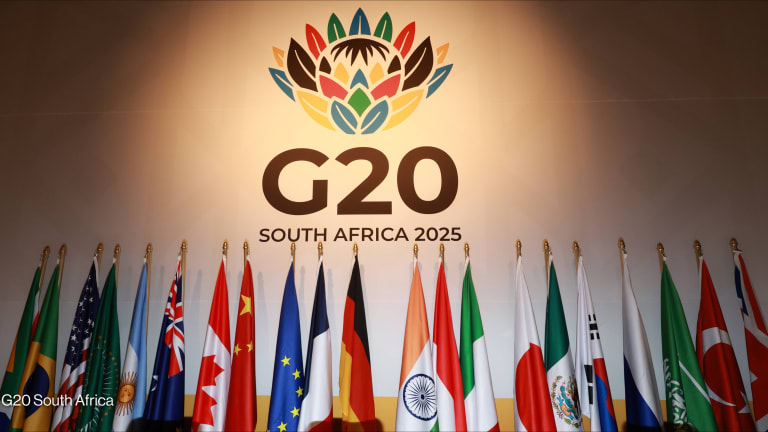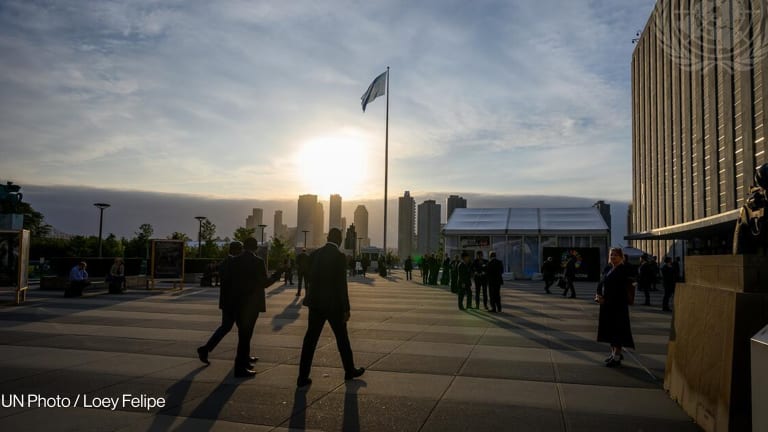
NEW YORK — Twenty-five years after world leaders agreed upon the landmark Beijing Declaration and Platform for Action, progress on gender equality remains uneven. The pandemic could now serve as a dangerous tipping point, experts say, threatening “major reversals” on women’s leadership and child marriage, among other issues.
“While there have been important advances in terms of school and college completion for women and girls, I think that the earlier assumption might have been that closing education gaps would accelerate women's economic opportunities and economic inclusion,” said Jeni Klugman, managing director of the Institute for Women, Peace and Security at Georgetown University.
“And while there was some progress, I think for much of the world that hasn't been the case. And then, of course, more recently with COVID we're seeing major reversals,” Klugman continued.
In the United States, the National Women’s Law Center recently found that 800,000 women have withdrawn from the labor force in August and September, compared to 200,000 men. Those numbers offer an indication of similar trends that will likely follow in other countries, Klugman said.
“I think there's a major kind of wake-up call that these persistent patterns, particularly in terms of responsibility for unpaid care in the home, mean that women's opportunities outside of the home remain very much constrained,” Klugman said.
More than 100 countries recommitted to the Beijing Platform for Action during a high-level U.N. meeting last week marking the 25th anniversary of the Fourth World Conference on Women. In 1995, tens of thousands of women from 189 countries met in Beijing to agree upon an action platform that has become a widely recognized blueprint for gender equality policy and programming work.
Since then, there have been various, significant gains for women and girls. More than two-thirds of countries have achieved gender parity in primary schools. Deaths during and after pregnancy dropped nearly 40% from 2000 to 2017, and more women have been elected to parliament and gained leadership positions in government and business.
“Decision-making is, by and large, still a male prerogative, because more decision-makers, whether in public life or private life, are still men.”
— Anita Bhatia, deputy executive director, UN WomenBut U.N. Secretary-General António Guterres released a review of the Beijing declaration’s implementation at the high-level meeting on Oct. 2, showing that initial commitments have not been matched by action, investments, or accountability.
Georgetown’s Institute for Women, Peace and Security and The Rockefeller Foundation also released a report ahead of the high-level meeting, calling for expanding access to better data, supporting women’s grassroots organization, recognizing youth leadership, catalyzing the private sector as a key partner, and pursuing intersectional justice demands. Twenty-three out of 106 countries do not have sex-aggregated data on the impacts of COVID-19, for instance, according to Global Health 50/50.
“Finishing the unfinished business of the Beijing platform is an urgent strategic imperative that all world leaders, men and women alike, must embrace,” former U.S. Secretary of State Hillary Clinton wrote in the report. “Not with tired ideas and incremental steps, but with boldness, passion, and resources needed to capitalize on the extraordinary events of this hour in ways that will transform our world for the better.”
The report also calls for reforming multilateral support for equity and engaging with powerful men and traditional authorities.
In some ways, the platform of action’s age shows, and appears out of step with the current political and social climate. It does not specifically address climate change, for example, and it does not reference the rights of people who are LGBTQI. The action platform also does not lay out a framework for financing, according to Anita Bhatia, UN Women deputy executive director.
More on gender equality:
► New tool tracks how policies are protecting women during COVID-19
► DFID faces 'wake-up call' on gender equality strategy
► EU going backward on gender equality, stagnating on climate action
“I think the Beijing platform, 25 years ago, was absolutely brilliant in terms of laying out a transformative issue, but the strategy was not sufficiently connected to finance. I think the big opportunity for the Beijing platform was fabulous, but it didn't think about the financing piece,” Bhatia said.
Some specific gaps in the platform’s implementation, like female leadership in government and businesses, meanwhile, have also been laid bare during the pandemic, Bhatia explained.
“When you look at pandemic decision-making and you turn on the television, it is all men,” Bhatia said.
As countries look to rebuild services and policy following the pandemic, most governments have not incorporated a gender-inclusive angle to their plans, Bhatia said.
“We have 50% more women in parliament than before, but it is still only 25% of parliamentarians. So while the relative changes are good, in absolute terms they are not good enough,” Bhatia explained.
Less than 10% of heads of state and heads of government are women, according to Bhatia.
“Decision-making is, by and large, still a male prerogative, because more decision-makers, whether in public life or private life, are still men,” Bhatia said.
COVID-19’s economic impacts are also beginning to show their effect on other backsliding trends. New analysis from Save the Children shows that the pandemic is putting an additional half-million girls at risk of being forced into early marriage, and as many as 1 million more are expected to become pregnant.
The increase is set to reverse 25 years of progress, which saw child marriage rates decline. But even before the pandemic, progress in ending child marriage in low- and middle-income countries has slowed since 2010, according to Gabrielle Szabo, senior policy and advocacy adviser on gender equality at Save the Children.
“These impacts are happening now, which means we do need to act now as part of decision-making,” Szabo said. “And we want to reflect on what works and the fact we have made progress.”
“We also know adolescent girls too often fall through the cracks. We need to make sure that this forward-looking agenda becomes a part of our building-back-better process and does not slip off the map,” Szabo said.








